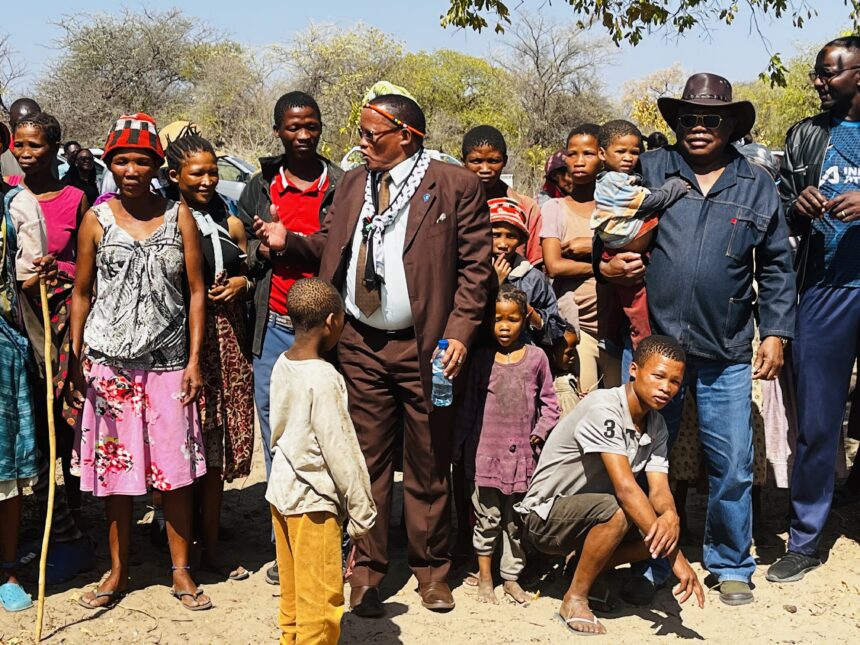Hilma Nakanduungile
EENHANA – On a scorching hot Monday afternoon, the deputy minister of marginalised communities Royal /Ui/o/oo, who was on a three-day visit to Ohangwena, arrived at the Olukula San Community Centre in the Okongo constituency.
The centre is home to about 100 San people.
/Ui/o/oo’s entourage consisted of esteemed leaders like Ohangwena governor Sebastian Ndeitunga, who requested him to delve into the living conditions of the San community in the region. As the deputy minister’s convoy drove through the centre where the meeting was scheduled to take place, some community members stood and watched from a distance, expecting the leadership to guide them as to what was to
happen. Their faces shone with smiles, with some attempting to
speak to him in the vernacular,
though with difficulties, since they speak different dialects.
Ears
Speaking through a translator, /Ui/o/oo highlighted the role of his division, and assured the audience of the government’s commitment to ensuring the well-being of marginalised communities.
He spoke at length, and queried them on multiple issues, including the availability of necessities at the centre. At this point, almost everyone wanted to say something.
One of them shouted “Indeni mu ka tale meetjuu detu nghee mu li.” which translates to “Go see what our makeshift houses look like”. She continued, stressing that they needed proper housing like other San communities who were fortunate to receive such from the government.
Having listened to their plight, the deputy minister gave the assurance that he had taken note of their concerns. He then took a tour of the makeshift houses. There, the situation is worrisome. One wonders how they survive winter and the rainy season since most of their structures are made of plastic and wood.
The first site set the tone for the rest of the centres he visited. In three days, /Ui/o/oo visited 13 centres within the Okongo, Oshikunde, Epembe, Omundaungilo and Eenhana constituencies. At some sites, he did not find anyone because the people had gone to cuca shops.
At most of the centres, issues of concern among the San community are almost alike, with key ones being alcohol abuse, high absenteeism among school-going children, low enrolment in schools, vandalism of infrastructures, and selling of items they are provided with.
Alcohol
The behaviour of some of the youth and elderly was not pleasing. /Ui/o/oo urged them to stop abusing alcohol, and to rather spend their money on valuable commodities to better their lives.
“You need to lead by example. If you, the elderly, are consuming alcohol the way you do, what example are you giving to the young ones? If you are a leader recognised by your people, from today on, you must stop taking alcohol. I am begging you,” urged /Ui/o/oo.
Education
At all centres he visited, school-going children were seen roaming around, even during school hours. Reports presented to him also revealed that most of them are not in school. Some never stepped into a classroom, some dropped out, and those who are said to be in school are dodging classes.
“Education is the greatest equaliser. As long as you are educated, all doors of opportunity will be open for you. Parents, I am encouraging you to please send these children to school up to tertiary institutions, rather than allowing them to follow you to the cuca shops,” he reiterated.
Vandalism
A development planner under the division of land reform Omagano Nakasole briefed the deputy minister. “At some centres, some residents have gone to the extent of removing the concrete floors from their houses, and instead put in sand. Also, some houses do not have windows and door locks”, the official stated.
Another concern is the selling of the food items they receive to non-marginalised communities, and sometimes exchanging them for alcohol, and end up starving.
“The government is doing its level best to better your lives. Therefore, I beg you to please take good care of whatever you are provided with. Also, I am calling on non-marginalised communities to stop buying items from these people,” she urged.
While some are reported to be vandalising houses allocated to them, those who live in temporary makeshift houses are calling on the government to construct proper houses for them, which should be able to cater for their growing families.
Another issue which some raised is the delayed delivery of food, and unavailability of water at their centres.
“All your concerns are noted, and be assured that the government remains committed to the well-being of its people. However, I am urging you to take care of all that you are supplied with,” pleaded /Ui/o/oo.
*Hilma Nakanduungile is an information officer at MICT in Ohangwena.


